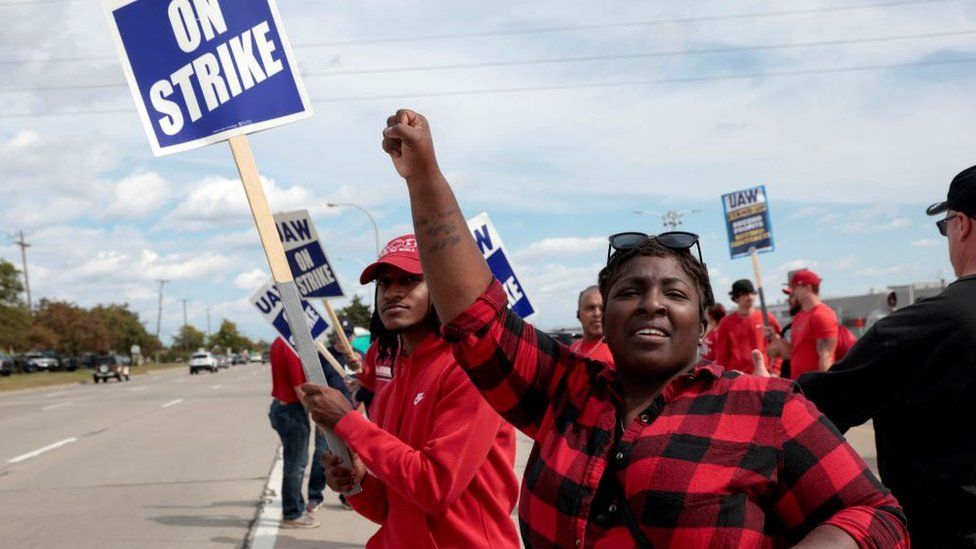General Motors deal clears way for end to US car strike
- Published

General Motors has struck a deal with the United Auto Workers (UAW) union to end a six-week strike in the US.
The tentative agreement follows similar deals at Ford and Chrysler-maker Stellantis, the other two carmakers affected by walkouts.
Nearly 50,000 workers and dozens of sites were involved in the action, the first in union's history to target all three firms at once.
US President Joe Biden welcomed the deal hailing the deal as "great."
The president added: "These record agreements reward auto workers who gave up much to keep the industry working and going during the financial crisis more than a decade ago."
Mr Biden had visited a picket line at the start of the strike to express support for the workers' cause, becoming what is believed to be the first sitting president in modern times to do so.
General Motors (GM), Ford and Stellantis have all now agreed to pay raises of roughly 25% over the four-year term of the new contracts, as well as other changes, including making it easier for so-called "temporary" staff to transition to full-time and receive full benefits.
For the lowest-paid workers, the changes could mean pay jumps of more than 150% by the end of the deals, according to the union.
Car workers will return to their jobs while the new contract is finalised, the union said in a statement.
"We wholeheartedly believe our strike squeezed every last dime out of General Motors," UAW President Shawn Fain said in a video address. "They underestimated us. They underestimated you."
The chief executive of GM Mary Barra welcomed the deal.
"GM is pleased to have reached a tentative agreement with the UAW that reflects the contributions of the team while enabling us to continue to invest in our future and provide good jobs in the US," she said in a statement.
Credit rating agency Moody's has estimated that such a deal would add more than $1bn in costs for each of the car companies.
Some company leaders have expressed fears that the added costs will give an advantage to rival carmakers with staff who are not union members.
But Art Wheaton, of Cornell University's School of Industrial and Labor Relations, said he expected the agreements to increase expectations for higher wages across the US car industry.
"The UAW has had a grand slam home run and has won for everybody," he said, adding that the UAW president had deployed "masterful" tactics in the row.
"Shawn Fain has dramatically exceeded my expectations for what he could accomplish," he added. "It's a massive success and a good sign for the future of workers in general."
Mr Fain, who was elected this spring, took a hard line in negotiations, casting the car workers' battle as part of a bigger fight against the "billionaire class".
He provided regular public updates on the talks, a break with previous practices, at one point theatrically ripping up a company offer in a social media broadcast.
The union, which opened talks seeking pay rises of roughly 40%, has kept the companies on the defensive, selectively adding new plants to the strike since its start in September.
It declared a walkout at another GM facility on Saturday.
GM said last week that the strike had already cost it $800m to date.
The labour fight at the car companies was closely watched, coming at a time when low unemployment and high inflation have emboldened worker demands across the country.
It follows high-profile stand-offs at UPS, Amazon, Starbucks and others.
Related Topics
- Published29 October 2023
- Published24 October 2023
- Published26 October 2023